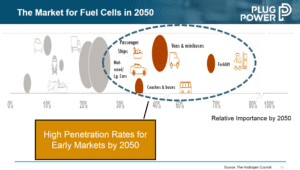Plug Power’s CEO joins The Hydrogen Council in Bonn: Hydrogen could contribute to 20% of CO2 emissions reduction targets by 2050
Tags: hydrogen council
The Hydrogen Council reveals first-of-a kind study showing hydrogen’s contribution as a key pillar of the energy transition
This week, Plug Power’s CEO, Andy Marsh, joins colleagues in Bonn, Germany for The Hydrogen Council’s COP 23 meetings. Here, industry leaders, united in The Hydrogen Council coalition, come together to launch the first ever globally quantified vision of the role of hydrogen, developed with support from McKinsey. The study shows that, in addition to being a key pillar in of the energy transition, hydrogen has the potential to develop US $2.5tn of business, creating more than 30 million jobs by 2050.
Many times in its narrative, Plug Power has discussed why fuel cells add value to customers. Most specifically on the road to electrification, Marsh has made it clear – rarely is there one solution for one that fits all.
In some cases, battery technologies have a solid place in the electric vehicle (EV) present and future. For short commutes and in-town driving, where high efficiency is most important, batteries may suit this need 70-75% of the time.
On the other hand, if energy density and range is important to the user, fuel cells make a great deal of sense as the electric vehicle (EV)  power. Fuel cell density is 10 to 15 times higher than li-ion batteries. And, if one starts looking at a world where EVs require high asset utilization – vehicles like autonomous EVs, buses, and delivery vans, fuel cells deliver a very promising power-alternative. Plug Power is leading the development of fuel cell engines for these applications – a solution we call ProGen – which promise high penetration rates leading to 2050.
power. Fuel cell density is 10 to 15 times higher than li-ion batteries. And, if one starts looking at a world where EVs require high asset utilization – vehicles like autonomous EVs, buses, and delivery vans, fuel cells deliver a very promising power-alternative. Plug Power is leading the development of fuel cell engines for these applications – a solution we call ProGen – which promise high penetration rates leading to 2050.
The Hydrogen Council press release notes, in reference to the Hydrogen Scaling Report issued in Bonn:
“This study confirms the place of hydrogen as a central pillar in the energy transition, and encourages us in our support of its large-scale deployment. Hydrogen will be an unavoidable enabler for the energy transition in certain sectors and geographies. The sooner we make this happen the sooner we will be able to enjoy the needed benefits of Hydrogen at the service of our economies and our societies,” said Benoît Potier, Chairman and CEO, Air Liquide. “Solutions are technologically mature and industry players are committed. We need concerted stakeholder efforts to make this happen; leading this effort is the role of the Hydrogen Council.”
Hydrogen, scaling up McKinsey study takeaways[1]
SOURCE: Hydrogen Council; IEA ETP Hydrogen and Fuel Cells CBS; National Energy Outlook 2016
[1] Company figures from financial years 2015 and 2016.
About the Hydrogen Council:
Launched at the World Economic Forum in Davos in early 2017, the Hydrogen Council is a first-of-its-kind global CEO initiative to foster the role of hydrogen technologies in the global energy transition. Current members include 18 leading multinationals – Air Liquide, Alstom, Anglo American, Audi, BMW GROUP, Daimler, ENGIE, General Motors, Honda, Hyundai Motor, Iwatani, Kawasaki, Plastic Omnium, Royal Dutch Shell, Statoil, The Linde Group, Total, and Toyota – as well as 10 dynamic players from across the value chain – Ballard, Faber Industries, Faurecia, First Element Fuel (True Zero), Gore, Hydrogenics, Mitsubishi, Mitsui & Co, Plug Power, and Toyota Tsusho. The coalition collectively represents total revenues of over € 1.5 trillion and more than 2 million jobs around the world.[2] To find out more: www.hydrogencouncil.com.
About Hydrogen Council meetings at COP 23:
The Council will gather at COP 23 to conclude the first year of its activity. While in Bonn on 13-14 November 2017, CEOs and other senior representatives will participate in a range of high-level roundtables, interactions with policy-makers as well as the media and the broader stakeholder community.
The Hydrogen Council is led by two Co-Chairs from different geographies and sectors, elected by Steering Members for a two-year term, each year one of the two Co-chair mandates is renewed for continuity.
For further information about the event and related media opportunities:
Hydrogen Council Press Office: Harriet Barham, +32 473 410 159, [email protected]
